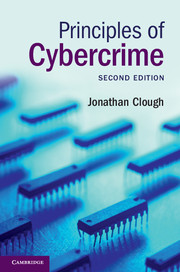Book contents
- Frontmatter
- Contents
- Preface
- Acknowledgements
- Table of Legislation
- Table of Cases
- List of abbreviations
- Part I Introduction
- Part II Computer as target
- Part III Fraud and related offences
- Part IV Content-related offences
- Part V Offences against the person
- Part VI Jurisdiction
- 14 Jurisdiction
- Bibliography
- Index
14 - Jurisdiction
from Part VI - Jurisdiction
Published online by Cambridge University Press: 05 October 2015
- Frontmatter
- Contents
- Preface
- Acknowledgements
- Table of Legislation
- Table of Cases
- List of abbreviations
- Part I Introduction
- Part II Computer as target
- Part III Fraud and related offences
- Part IV Content-related offences
- Part V Offences against the person
- Part VI Jurisdiction
- 14 Jurisdiction
- Bibliography
- Index
Summary
Crime in cyberspace
It is one thing to enact criminal offences to address online conduct; it is quite another to assert jurisdiction over offenders who may be located anywhere in the world. We saw in Chapter 1 that early scholarship postulated cyberspace as a distinct place, beyond traditional rules based on geographical location. This has not, however, proved to be the case, ‘with States now consistently applying traditional territorially based rules to online activity and largely refusing to treat the internet as beyond their competence’. This is especially true in the criminal law which is necessarily ‘grounded’ in notions of territoriality.
This chapter provides an overview of the principles which apply to the exercise of criminal jurisdiction over extraterritorial conduct. In this context, the term ‘jurisdiction’ in fact conceals three distinct concepts which require separate discussion:
1.Does the state have legislative power to regulate the relevant conduct (‘prescriptive jurisdiction’)?
2.Do the courts have power to hear the particular dispute (‘adjudicative jurisdiction’)?
3.Does the state have jurisdiction to enforce the law (‘enforcement jurisdiction’)?
Prescriptive jurisdiction
Prescriptive jurisdiction, also known as legislative jurisdiction, is addressed in Art. 22 of the Cybercrime Convention. This sets out a number of bases on which parties are to establish jurisdiction, but does not exclude other forms of jurisdiction exercised by a country under its domestic law. The first is where the offence is committed within its territory, reflecting the principle of territoriality. This is the most common basis for the exercise of criminal jurisdiction, there being a general presumption that criminal laws are local in operation. Although allowing a country to exercise jurisdiction over conduct which occurs within its sovereign territory, there are a number of ways in which the territorial principle operates to encompass extraterritorial conduct.
First, a country may assert territorial jurisdiction over conduct which occurs on a flagged ship or registered aircraft of that country. This is specifically recognised in the Convention, and expands the scope of territorial jurisdiction to those situations where the ship or aircraft is outside the terrestrial jurisdiction of the relevant country. Such an extension of territorial jurisdiction is important in closing potential gaps in jurisdictional reach. For example, if the ship or aircraft is in international waters or airspace, no other country may be able to assert jurisdiction in respect of that conduct.
- Type
- Chapter
- Information
- Principles of Cybercrime , pp. 475 - 488Publisher: Cambridge University PressPrint publication year: 2015



